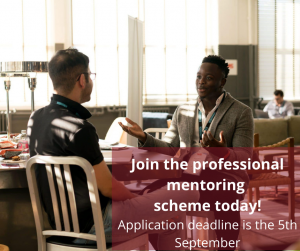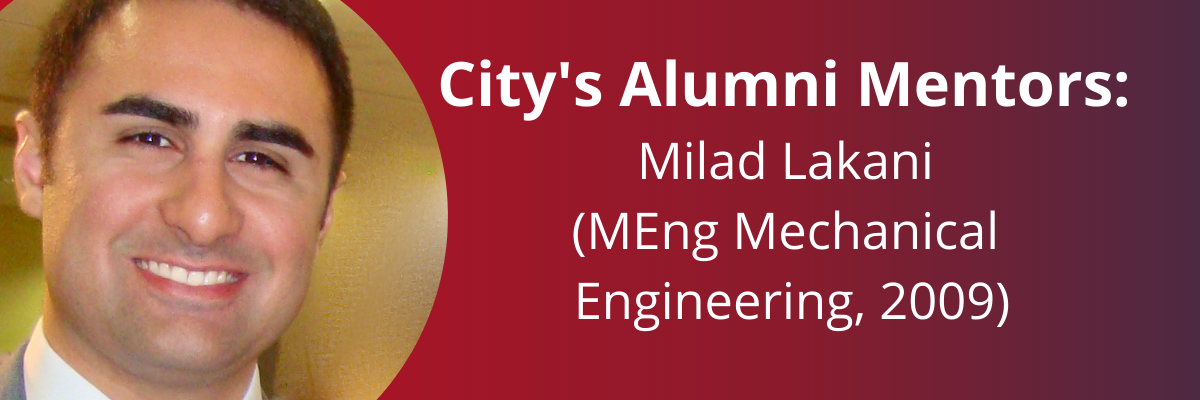Since graduating from City, University of London in 2009, Milad Lakani has worked in a variety of roles across the engineering sector. Having kept in close contact with his alma mater, in 2016 Milad was invited to take part in the University’s mentoring scheme. Milad has continued with the scheme ever since, providing vital insights to a number of students over the years. His commitment has recently been recognised as Mentoring Excellence Award winner 2021! We spoke to Milad about his mentoring journey and his advice for those considering joining the scheme as a professional mentor.
Tell us a bit about your time at City.
 I achieved a First Class honours degree qualification in Master of Engineering (MEng) Mechanical Engineering from City, University of London in 2009. I was nominated for the ‘Fredrick Barnes Waldron Best Student Award’ by the Institution of Mechanical Engineers on the recommendation of the Department of Mechanical Engineering and Aeronautics.
I achieved a First Class honours degree qualification in Master of Engineering (MEng) Mechanical Engineering from City, University of London in 2009. I was nominated for the ‘Fredrick Barnes Waldron Best Student Award’ by the Institution of Mechanical Engineers on the recommendation of the Department of Mechanical Engineering and Aeronautics.
During four years of active involvement in the Widening Participation (WP) Tutoring Scheme, I worked as a Mathematics tutor on a weekly basis at various primary and secondary schools in London. I was also selected as a Student Ambassador to take part in Engineering Summer Schools annually. At a young age, tutoring enabled me to develop many transferrable skills which I continue to benefit from greatly in my professional career. I gained a lot from tutoring and, having found it particularly rewarding, I was particularly keen to continue helping others in this way when I was given the opportunity to become a professional mentor later down the line.
How did you first hear about the Professional Mentoring Scheme? What inspired you to join the scheme?
Having kept in close contact with the WP team since graduation, I was invited to take part in the Professional Mentoring Scheme as a Mentor in 2016. Joining the Mentoring Scheme was an easy decision for me to share my passion, skills and project experiences with Undergraduates who aspire to succeed in a career in professional engineering. I strongly believe my main motivation for mentoring began to develop through my involvement in the WP scheme as a Mathematics tutor and Student Ambassador. I am always keen to learn, even now. I keep up to date with the latest global project journals and technology advancements, but I also find that I learn a lot from my mentees themselves.
In your opinion, what is a mentor supposed to do?
A good mentor doesn’t just talk about how good they are but show it through their own actions in order to present themselves as a positive role model to mentees. Good mentors can empower their mentees and help them develop their own strengths and personal attributes. Good mentors take a personal interest in the relationship with their mentees and treat it as an important part of their life. As a result, a successful mentor feels invested in the mentee’s successes. If a mentor isn’t enthusiastic about the mentee, it will show, and the mentorship is not likely to work out.
What do you wish a mentor had told you when you were studying or getting started in your career?
If I could turn back time, I would definitely try to go for an industrial placement year. It’s absolutely critical to stay focused and aim for a well-respected degree. However, having relevant industrial experience on your CV will definitely make your application stand out from others.
If you missed out on an industrial year, then my personal advice to Undergraduates is to get involved in City’s WP scheme as much as possible. In addition, I always encourage my mentees to sign up for free Affiliate or Student membership at a recognised institution. There are many opportunities to take advantage of the huge wealth of e-learning courses, conferences and seminars. Build your engineering knowledge by networking at regional events and seek career advice on searching and preparing for interviews, jobs and internships.
What has been one of the highlights of your time as a mentor?
 A mentor should create long-term goals and short-term objectives with mentees to help them achieve their ultimate aims in their careers. The highlight of being a mentor is being able to witness the many accomplishments of the mentees I work with. I was pleased to put forward a CV of a former mentee to my previous employer for an internship position. I am always happy to stay connected with my mentees and have been so pleased to see them grow professionally throughout the years.
A mentor should create long-term goals and short-term objectives with mentees to help them achieve their ultimate aims in their careers. The highlight of being a mentor is being able to witness the many accomplishments of the mentees I work with. I was pleased to put forward a CV of a former mentee to my previous employer for an internship position. I am always happy to stay connected with my mentees and have been so pleased to see them grow professionally throughout the years.
Choosing a mentor does not need to be as stressful or complicated as it seems. Find one that fits you, and work to make it a rewarding experience. You’ll not only find the best version of yourself, but you will have gained a life-long friend and supporter in the process.
Could you share some of your key career/life advice?
Think of yourself as a lifelong learner. You can continue to learn no matter at what stage of your career you are. When you learn continuously, you can gain more skills and become flexible and adaptable in your career path. Possessing a willingness to learn is an attribute that is highly valued in today’s workforce.
What would you say to someone who is considering becoming a professional mentor?
Help your mentee to set realistic expectations. Also, if you know you will be unavailable because of business or personal commitments, let them know. Engage in your own learning while you are mentoring, collaborate on projects, ask questions and experiment. Remember that people come from diverse backgrounds and experiences. Get to know each other on an individual basis. Provide active listening and maintain consistency to be able to build up a high level of trust environment and confidence that the mentee feels his or her positive contribution towards an objective is valued.
